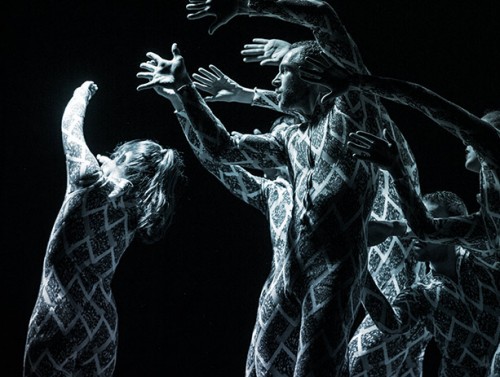Tag archives: CERN
Physics World 2014 Focus on Big Science is out now
By Michael Banks
This year has been a special one for the CERN particle-physics lab near Geneva as it turns 60 years old. It was back in 1954 when the CERN convention was ratified by its first 12 member states and the European Organization for Nuclear Research was officially established.
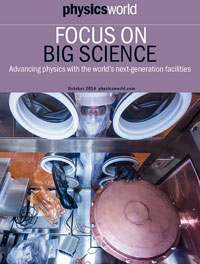 The past few months have seen CERN celebrate in style with a whole host of symposia, meetings, plays, films, concerts and other events being held at the lab and at member states across Europe.
The past few months have seen CERN celebrate in style with a whole host of symposia, meetings, plays, films, concerts and other events being held at the lab and at member states across Europe.
Indeed, researchers at CERN have had a lot to celebrate recently, following the discovery of the Higgs boson at the lab in 2012, and they will be hoping for yet more success when the Large Hadron Collider (LHC) switches on next year following a two-year upgrade and maintenance programme.
In the latest Physics World focus issue on “big science” we look at what has been going on at CERN during the shutdown as the lab gears up to hunt new particles beyond the Higgs boson. Once back online, the LHC will be generating even more data than in its previous run and this focus issue also investigates how researchers are going to deal with the huge volumes of information that will be generated at many upcoming facilities, as well the need to train the next generation of researchers to use them.
View all posts by this author | View this author's profile
Quantum dances at the intersection of science and culture
By Robert P Crease
I’m fascinated by the interactions between science and culture, which is what led me to the Brooklyn Academy of Music (BAM), which was hosting the US première of a dance piece called Quantum that had previously debuted where it had been created, at CERN. The event was staged in a simple, black-box space, with the audience seated around a square floor in three rows with no proscenium. But it was an upscale black box, with elegant seating upholstered in a blue-and-gold metallic sheen. Four industrial lights were suspended from the ceiling by long cables.
View all posts by this author | View this author's profile
Relive CERN’s highlights as the lab turns 60
By Matin Durrani
CERN has been celebrating its 60th anniversary all this month, but it was in fact six decades ago today – on Wednesday 29 September 1954 – that the lab’s convention was ratified by its first 12 member states: Belgium, Denmark, France, Germany, Greece, Italy, the Netherlands, Norway, Sweden, Switzerland, the UK and Yugoslavia.
Physics World has played its own small part in marking the anniversary, including a careers feature on what skills you need as CERN director-general, a day-in-the-life blog written by current CERN boss Rolf-Dieter Heuer, and an appearance at the lab’s TEDx event last week by our columnist Robert P Crease.
This blog entry rounds off our coverage of CERN at 60 with a few links to classic material from our archives.
View all posts by this author | View this author's profile
How to give a great TEDx talk
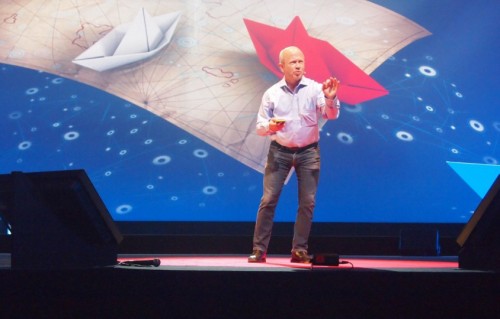
Hitting his stride – Robert P Crease in full flow at yesterday’s TEDx talk at CERN after forgetting about the timer, which is the small object at his feet. (Courtesy: Maya Elhalal)
By Robert P Crease in CERN, Geneva
It’s great to go first.
Then you can actually listen to the other performances without fretting about your own. Somewhere near the middle of my TEDxCERN talk yesterday (Wednesday 24 September) I stopped being aware of the timer at my feet, began to have fun and left the stage at the end without even noticing whether I had exceeded my time limit. I made a brief stop backstage to lose my “Madonna” – a microphone that’s not on a neck clip or attached to a headset but extends out from an ear brace – then retook my seat in the front row.
View all posts by this author | View this author's profile
Behind the scenes at CERN’s TEDx event
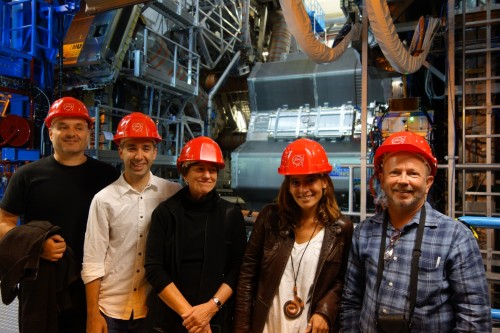
All-star line-up – Physics World columnist Robert P Crease (far right) in front of the ATLAS detector at CERN’s Large Hadron Collider as he and his fellow speakers brace themselves ahead of today’s TEDx talks at CERN.
By Robert P Crease in CERN, Geneva
On Tuesday morning I addressed 1300 empty chairs.
I was the first of several presenters yesterday at a dress rehearsal for the TEDxCERN event, which takes place this afternoon, Wednesday 24 September. The rehearsal was held in a huge tent specially constructed for this event, and for CERN’s 60th-anniversary celebrations next week. The programme will be broadcast live today starting at 1.30 p.m. CEST (GMT+2).
It isn’t easy, I discovered, to grab the attention of empty chairs. I stumbled over sentences and forgot to click my slides. Occasionally I felt on automatic pilot, and had the eerie experience of hearing myself speak with a half-second delay, as if I were listening to myself from the back of my head. I went a minute over time and also discovered a typo in a slide that I had viewed approximately a zillion times before. I was relieved to find I wasn’t the only one; some of those who followed, too, tripped over delivery or had trouble with slides.
View all posts by this author | View this author's profile
The birthday party goes on at CERN
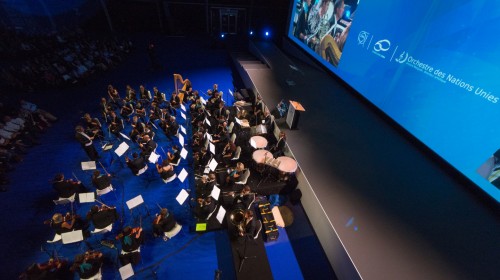
Sorry, you missed this concert by the UN Symphony Orchestra on 19 September, but there is more music coming up. (Courtesy: CERN)
By Hamish Johnston
All this week the people at CERN and in its member states will be celebrating 60 years of particle physics at the world-famous lab in Geneva. There is something for everyone to enjoy and here are a few highlights that we have picked out
View all posts by this author | View this author's profile
A TEDx train wreck?
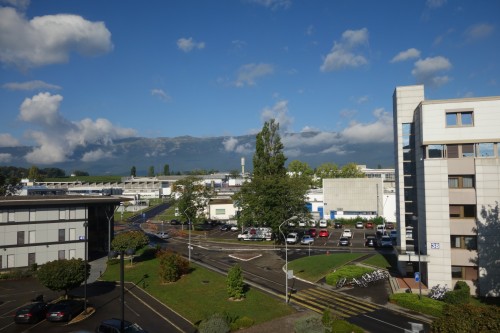
Calm before the storm – the view of CERN from Robert P Crease’s bedroom window as he tries desperately to shave a final two minutes off his TEDx talk.
By Robert P Crease in CERN, Geneva
On Sunday morning I arrived at CERN to find workers putting finishing touches on a huge tent where the lab will host its TEDx event on Wednesday, and its 60th anniversary festivities next week.
“TED”, which stands for Technology, Entertainment, Design, is a non-profit organization that promotes talks on what it calls “ideas worth spreading”; the “x” denotes an independent event organized in that spirit. This is the second TEDxCERN – the first took place last year – and it’s hosted by Brian Cox. More than 1000 people will watch 14 speakers, three performances and three animations; tens of thousands more viewers are expected online.
James Gillies, CERN’s head of communication, invited me to be a speaker. The subject this year, he said, was how science could better engage with major social challenges. He said that my May Physics World column “Why don’t they listen?” – on why scientists have difficulty getting politicians’ ears – had “hit the nail on the head”, and asked if I’d be interested in discussing the idea.
A week at CERN? A great excuse to implore colleagues take over my classes? Sure! All I had to do, I thought, was talk my way through some extended version of the column.
A scientific pyramid scheme, symmetry through the ages, why physics students are “standing a little taller” and more

Pyramid power: this lovely object has nothing to do with postdocs. It is a simpler version of a much larger Sierpinski tree that can be found on London’s South Bank.
By Hamish Johnston
Just this week six people were convicted in Bristol of crimes related to running a pyramid scheme. This involves taking money from lots of new investors and giving it to a smaller number of investors who signed up earlier – until the pyramid collapses. Is the current model for training scientists a pyramid scheme of sorts? That is the claim in a piece on the US’s National Public Radio (NPR) website written by Richard Harris.
View all posts by this author | View this author's profile
A day in the life of CERN’s director-general
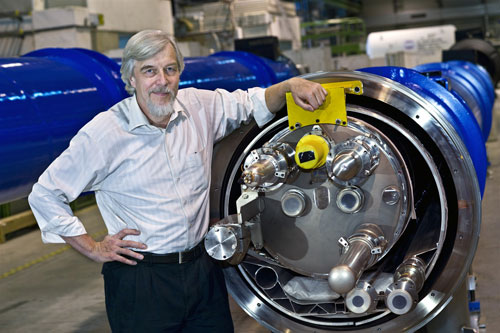
All in a day’s work. (Courtesy: CERN)
By Rolf-Dieter Heuer, Geneva
There is no such thing as a typical day in the life of a CERN director-general (DG), certainly not this one in any case. In my experience, each incumbent has carved out a slightly different role for themself, shaped by the laboratory’s priorities and activities at the time of their mandate. For me, every day goes beyond science, management and administration, and I am particularly fortunate to have been DG through a remarkable period that has seen not only the successful launch of the Large Hadron Collider (LHC) and confirmation of the Brout–Englert–Higgs mechanism, but also an opening of CERN to the world – an area that I have pursued with particular vigour.
As I regularly joke, we have changed the “E” of CERN from “Europe” to “Everywhere”, and that has meant a lot of travel for the CERN DG, as we hold discussions with prospective new members of the CERN family. And when the CERN Council opened up membership to countries from beyond the European region in 2010, it seemed to me that we should also be extending our contacts in other directions as well.
View all posts by this author | View this author's profile
Is desperation for new physics clouding our vision for new colliders?
By Hamish Johnston
This month marks the 60th anniversary of CERN and to kick-off our coverage here at physicsworld.com, I’m highlighting an essay on the future of collider physics that has just been written by Nobel laureate Burton Richter called “High energy colliding beams; what is their future?“.
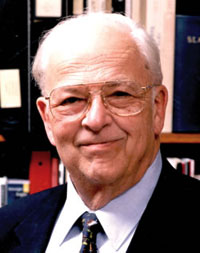
Burton Richter warns against desperation. (Courtesy: Stanford University)
Richter shared his 1976 Nobel prize with Samuel Ting for their independent discoveries of the J/ψ meson. He knows his particle colliders, having helped to design and build the world’s first collider in the late 1950s at Stanford University and later directing the Stanford Linear Accelerator Center for 15 years.
Richter believes that the international community is not facing up to tough decisions that must be made about what to do when the Large Hadron Collider (LHC) is retired sometime in the early 2030s. He thinks that “the perspective of one of the old guys might be useful”.
Planning the next huge collider involves the co-operation of three main groups of physicists: those who design and build the accelerators; those who design and build the experiments; and the theoretical physicists who work out what the experiments are looking for. Richter thinks that this is not going well at the moment.
View all posts by this author | View this author's profile
